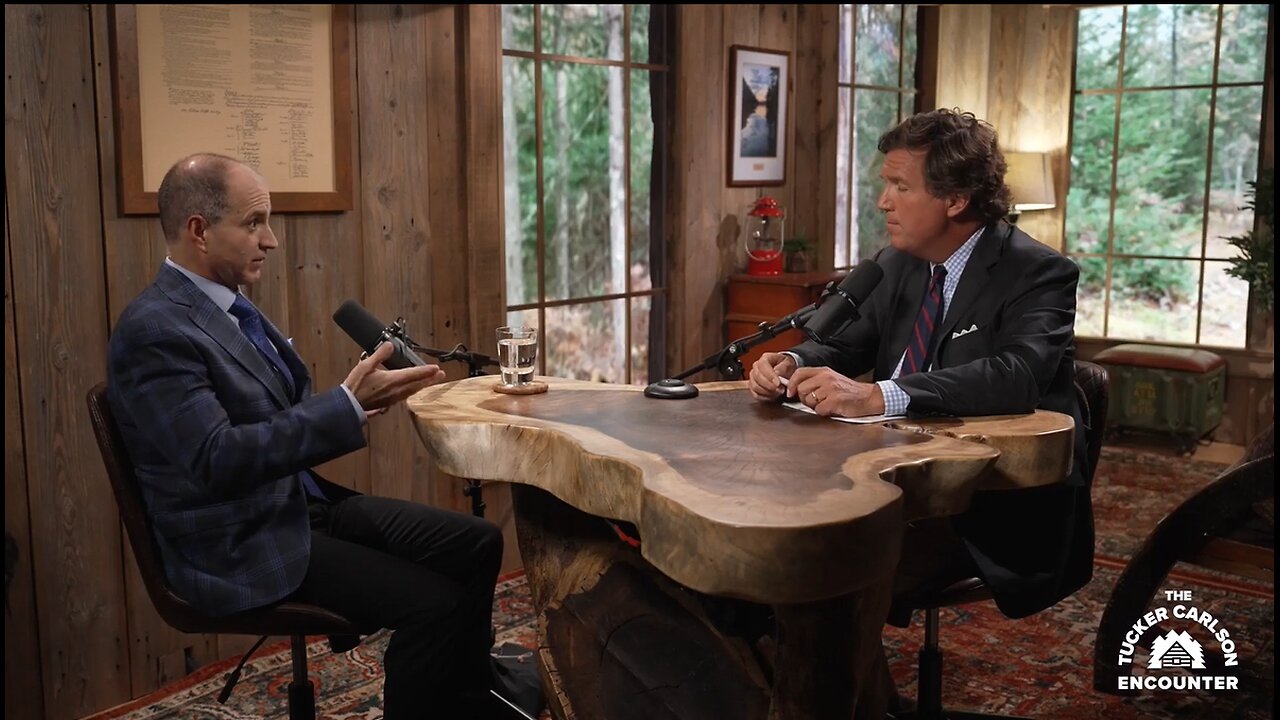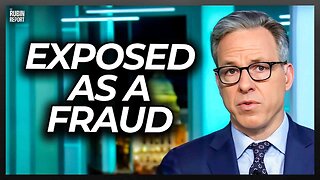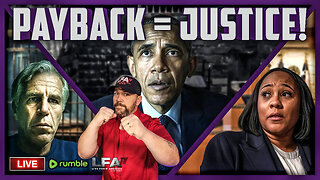Premium Only Content

Tucker Carlson Encounter: Pedro Israel OrtaA former agent says inside agency is falling apart
The Tucker Carlson Encounter: Pedro Israel Orta
Encounter
https://tuckercarlson.com/the-tucker-carlson-encounter-pedro-israel-orta/
•
Published Apr 13, 2024
READ THE TRANSCRIPT
Tucker [00:00:00] If you're a middle aged person in the United States, you probably grew up thinking of American federal Intel agencies and law enforcement agencies like the FBI as basically good institutions and the people who criticize them as fundamentally anti-American. Why would you be criticizing the CIA, for example, when the CIA protects us from foreign enemies and brings vitally needed intelligence to the people who make our policies? Of course. So if you're against CIA and against FBI, you're probably against the United States. And then a lot of things happen that may have started to change your mind, maybe slowly at first. 911 the consolidation, the streamlining and the massive enlargement of these agencies because we needed to do that to protect ourselves. They became a lot more powerful than they had been before. 911 but maybe you weren't paying attention. But by the time we got to 2016, and it was very clear that the CIA, for example, was not just aimed outward at our enemies, but aimed inward at our citizens. That may have changed your mind pretty completely and forever, and for good reason. She is not a force for democracy, at this point at all. In fact, you can't have a democracy in a country where some of the biggest decisions are made by unelected federal employees in an agency whose budget you're not allowed to know in secrecy, no democracy possible in a country like that. So the CIA, well, it clearly performs services that are needed is also a force for evil in this country. There's no other way to say it, but what exactly does that mean? What does the CIA do? What does it look like if you work there, what's the vantage from inside? Well, it might be worth talking to someone who's experienced that for almost 20 years. And today we are. Pedro Israel Auta is a retired CIA officer, done a lot of other things, too. His family came here fleeing tyranny in Cuba. So he went into government service with the highest possible ideals and hopes and exited with something else. He's the author of the book The Broken Whistle A Deep State Run Amuck, and we're happy to have him with us today. Thank you so much for coming, I appreciate it.
Pedro Israel Orta [00:02:02] Thank you, Tucker, for this opportunity.
Tucker [00:02:04] Oh my gosh, of course. So I thought it might just be interesting to hear your story. Like how did you wind up at CIA? Where are you from? What were your assumptions going in?
Pedro Israel Orta [00:02:13] I managed to finish my university studies a little late in life, early 30s, and I study international relations, political science. I've always been interested in all matters related to defense intelligence. Yes, to foreign policy. Growing up in Miami in the 70s, the 80s, you know, the Sandinistas, the contra wars.
Tucker [00:02:34] Yes.
Pedro Israel Orta [00:02:34] So, so forth. So when I graduated from FIU, Florida International University, while there, I was recruited by the CIA.
Tucker [00:02:43] I'm sure to ask you about what were you doing before then? Why did you take till your 30s to graduate college?
Pedro Israel Orta [00:02:48] I had to work my way in Miami. I mean, my family came from Cuba with basically nothing. They started from zero. So my parents didn't have the money means to send me to college. So I ended up going into the workforce, working in the Miami business field. And after so many years of work, and it was hard work being an outdoor salesperson, knocking on doors, doing perishable commodities, grocery products, I worked a lot of hours. It was. Yeah. I managed to get my Associate of Arts degree, by graduated high school 85. Got my Associate of Arts degree, 1989. But from 89 to 96, it was just a lot of hard work. So I finally I was able to do a massive change in my life. I basically said I cannot continue going down this route of outdoor sales. So I went into the indoor sales field with a job that was near the university. So I would go into work early in the morning like 7 a.m. and get out of work like 4 p.m., run to the university, take classes from 5 p.m. to 9 p.m. I did that for three years. Finally got my Bachelor of Arts, summa cum laude graduate, political science, international relations. And that's how it all started with CIA.
Tucker [00:04:01] That's the most virtuous possible path, obviously. How were you recruited by CIA? How does that work?
Pedro Israel Orta [00:04:07] They would have events at the universities. Staff officers would come down to the university, make a presentation. In this particular case, I was the director of intelligence. Yes, or intelligence analysis. So basically you hear the presentation, you sign up to be interviewed. And I went to an interview. I impressed the two individuals. And, you know, within two weeks I had basically a conditional offer to be a graduate fellow pending the background investigation. So that process took like seven months. I finally received the offer to yes, we you've been accepted. You can come in as a graduate fellow. So at that point in time, I've moved up to D.C. I'm currently going to George Washington University to study for a master of Arts and Security Policy Studies. And I same scenario. It's basically working almost full time at 1.40 hours a week, then 32 hours a week, and then back to 40 hours a week, and going basically to graduate school on a full time basis to earn my Master of Arts and Security policy studies and converted that graduate fellow into a full time CIA staff officer position.
Tucker [00:05:18] So what did you do for CIA?
Pedro Israel Orta [00:05:21] I started working in the analysis field as a certified career analyst, program analyst, where I was trained to do analysis, and I was basically the lead analyst doing counter drug analysis for Central America and the Caribbean. And I did that for almost four years.
Tucker [00:05:36] And pardon my ignorance. What does that consist of? What's your day look like? What do you do at work?
Pedro Israel Orta [00:05:42] This particular time it was right immediately after post 9/11. Can you imagine Caribbean, Central America was really not a priority? No. So, I mean, our our intelligence sources, information coming in was sparse, so I had to use a lot of my business skills networking, working with DEA, the Department of State, different offices to find additional sources of information, to supplant that with whatever we were getting from traditional sources. Yes. And it was just a lot of kind of research and investigatory type skills, trying to just find pieces of information to find out what exactly is going on with the drug trafficking in Central America and the Caribbean. And we would take all that information and turn it into a finished intelligence product to inform senior executives such as, you know, cabinet secretaries, the president himself, the president's daily brief. And it's just a daily routine of just lots of reading, lots of research, phone calls, having meetings, just constantly.
Tucker [00:06:46] So you're trying to figure out how narcotics are coming in the United States, and you know who's doing this? It's how are they doing it?
Pedro Israel Orta [00:06:55] Who's doing it, how they're doing it, where they're going. We're looking at, okay, what were the trafficking lines? Yeah. Where are traffickers basically going with their drugs? I mean, back back then during this particular time, from early 2000, the Pacific coast was big. So there were a lot of boats leaving the west coast of, upper South America, kind of the Colombian Pacific coast. Yes. Going up to Central American to Mexico. But at the same time, during that time, we still had some drug trafficking in the Eastern Caribbean, and also the Canada, the Caribbean side of Central America. And we were constantly just monitoring, trying to determine exactly when and where and who, what, when so forth, to be able to inform so that they can take it into, you know, actionable intelligence for, interdiction operations or for that matter, for the president and his cabinet secretaries to use to as leverage with different nations in Central America, Mexico, so forth.
Tucker [00:07:55] Wow. So you do that for four years. What do you do next?
Pedro Israel Orta [00:07:58] Well, what happened then was I had enough of the analysis branch. Yeah. I mean, I had worked out door sales. You know, I'm kind of I like the business, the network gain, the people contact. Yeah. Being glued on a computer screen for so long. Yes. Just like I had enough. Yeah. Especially after going to school for three years at FIU, two years at George Washington. So I volunteered to go to Iraq. I back then we had the the Iraq War, 2003, 2004. So at that point in time, it's like this is a great opportunity for me to serve my country, you know, do good. I know I can go out there and serve our interest. So I went out, once known as a short term TDY and, managed to turn that into a full time position out there. And I did two years in Iraq for two years. We did take breaks. They gave us typically three week breaks three times a year. So that kind of broke it up. But we would work 2 or 3, four months about a day off constantly 80 hours a week. Plus I was actually on call 24 seven. I went out there and I worked in in the capacity where I work with senior station leadership, working with senior military officials and other government agencies, doing a lot of liaison work, basically representing the CIA to these other entities and these other entities representing them to the CIA. A lot of deconfliction making sure we're not crossing paths, making sure that our operations are not basically overlapping each other, working on life and death issues. You know, if somebody lives is in danger, immediately call the military, get a quick response team out there to rescue people. Many different little things.
Tucker [00:09:36] How big was the CIA presence in Iraq when you were there?
Pedro Israel Orta [00:09:39] Well, that I can't discuss, but it was a huge footprint, that huge, huge footprint. I mean, it's significant. It was probably the largest station in the world that point. And probably not only that, but yeah, it was the largest at that point.
Tucker [00:09:53] And it wasn't just gathering intelligence or conflicting with other federal agencies. It's also. Taking more active role. Correct?
Pedro Israel Orta [00:10:01] Well, back back then, during the early 2000 era in Iraq, 2004 2006, you had the Shia uprising and you still had the Sunnis who were rebelling against the US invasion. So we were basically being attacked by two different sides on the West. The Sunnis were trying to destabilize and Anbar and not allow, you know, the coalition forces to establish a fully functioning democracy in Iraq and then Baghdad and other areas. You had the Shias who were trying to finally, for the first time, implant their will in the government because they had been repressed for so many years. And keep in mind you now had also the Kurds on the north. So you had a balancing act of balancing the Kurds, the Shias in the Sunnis. And it was it was a disastrous situation. Yeah. It was essentially a no win situation. And it was obvious to everyone that the Shias will win the presidential elections and even the parliament. But thankfully, the Kurds were strong enough to offer enough of a counterbalance, and all government operations in the country had to deal with all three of those counterinsurgency operations against the Sunnis. You know, counterinsurgency to a degree, against the Shias, all the political, you know, factions and the managing the Kurds, keeping the Kurds happy because the Kurds wanted to pull out and form their own country.
Tucker [00:11:27] Of course they did, and they effectively did anyway. Right. But, so you were there for four years.
Pedro Israel Orta [00:11:33] I was in Iraq for two years, rather. Yeah. At that point in time, after Iraq, I managed to get another assignment that would give me the Department of Operations, Operations Officer Certification course. So I went back to CIA headquarters to night and day difference between working in Baghdad and going back to CIA headquarters. I mean, it's just a bureaucracy, a monstrous ocracy. And, you know, it was a rough time for me trying to make that transition because unfortunately, I got myself into a situation where I wasn't a chosen officer to fill that position. It was because one of my former supervisors kind of forced that position on some of the decision makers, so they were trying to get me to pull out of that job, but I managed to stay and complete the training. And after that, seven, nine months back at CIA headquarters, deployed back to the field in a country that I cannot name, where in the name I name it fictitious, named Kamino. And I was basically back in the thick of things, doing a lot of the counterterrorism, counterinsurgency operations in this particular case, working with host country entities, basically targeting targeting the bad guys.
Tucker [00:12:52] So what went wrong? That sounds like an interesting job.
Pedro Israel Orta [00:12:57] Well, CIA is a big bureaucracy, that this started one phase of, blowing the whistle. Eventually, what happened in that station with me, that some of the managers in that station, it in order to be a little bit comical, I named them basically Moe, Larry and Curly. Yeah, because it was just that comical. It's a matter of fact. I named the station Potemkin station because, I mean, in contrast to Baghdad Station, this was an amateur division, and I had a stellar work history. By the time I got to this station, I had I had lost track had been five exceptional performance awards, four of them in Iraq, one in the counter drug work that I, I got promoted while I was I was in this country. They wanted me to extend for a fourth year, and eventually they found somebody else that they wanted to put in my position. So they were trying to get me to cancel my third year extension. And when I refused to cancel that, they started cooking up a plot to basically denigrate my character, my work, and essentially they basically forced me out. But the thing about this is that in this process, you know, I blow the whistle on abuses of authority, girls, mismanagement, significant EEO issues. And sadly, you know, I found out the hard way that the inspector general, the equal Employment opportunity, they really don't care. They're basically don't go in like the cleanup crew to cover it all up, sweep it up. And that's what happened in my case. But, you know, I, I fought in this particular case because I had a pregnant fiancee daughter yet to be born, and I was fighting for the future of my marriage and my, my daughter. So I had no choice to stand up to this tyranny. I mean, these were tyrannical tactics that they used to force me out of a job that, you know, sadly, the reality is it cost. The CIA. Hundreds of thousands of dollars, if not more than a million to train me and deploy me and keep me there. So, I mean, there were defrauding the government of money just by kicking me out. So one man fighting against the system. Forget it. You know, I obviously lost that battle. But I was able to from there, go to Afghanistan. And I went to Afghanistan in January of 2010, which was right after the coast suicide bombing attack.
Tucker [00:15:29] Yes.
Pedro Israel Orta [00:15:30] And as a counterintelligence referent, it was a critical position I would have in combating additional threats to ensure that our operations would be safe from potential suicide bombers, among other threats. And I managed to do very well in that year in Afghanistan, you know, got great performance appraisals. And, I was a die analyst still on paper, despite having director of operations certifications, having done director of operations work in Iraq and in this other country named Kamino. So by the time I left Afghanistan in early 2011, I was still analyst looking to transition to director of operations. And I managed to land a job with the Information Operations Center doing technical targeting that I began in basically the spring of 2011. And this just takes off and goes at different what.
Tucker [00:16:25] Is tactical targeting?
Pedro Israel Orta [00:16:27] Technical targeting comprises different facets. We were doing basically looking at digital data to look for terrorist, what they were doing online in order to be able to find them so that we can interdict them. I did that countering terrorism in the Middle East. Basically the Arabian Peninsula, the Levant, the Horn of Africa.
Tucker [00:16:53] Wow. So how did your opinion of CIA change while you were there? Like, by this point, you realize maybe they're not helping the United States.
Pedro Israel Orta [00:17:03] Well. I realized that when I worked in Baghdad in 2004, 2006, I worked for a lot of the older managers that came in and probably the 80s and the 90s. And I noticed that they had a lot of skilled and capable leaders. Some of these were former police officers, former military, former businessmen. They came into the agency with a lot of experience. Post 911. Fast forward into 2010. Now I'm beginning to work with a lot younger officers who had no life experiences. It came fresh out of college and there were remarkable differences between both generations. And it would all come to a crash in the climax further down the road. Post Afghanistan post headquarters. When I went back out to Afghanistan, when I went back out to Afghanistan in 2014, now I find myself as a deputy chief of base. Which I am entrusted with a significant position. Our number one priority is keep our officers safe. And in this particular case, we're there to fight a war. I mean, that's what we're doing in Afghanistan. Now I'm working for a new set of managers who are at the base. The chief of base. And for that matter, even some of the lower level managers at the Kabul station who really were not cut up to the job of being in Afghanistan and these kind of wars. And unfortunately, office politics, vindictiveness, abusing the position for your own gain became a prevalent issue. And in this particular case, I find myself in a very, very hard position. I'm working for a very nice lady who I respected, who had her skills and capabilities, but she was not cut out for this job. Couldn't handle the dirt, the grime, the noise, the isolation, the long hours, the rockets landing on top of you, out of nowhere at no time. And it would be basically awakened. There's a rocket, you know, inbound. Kaboom. You know, jump off your bed and go find out what's going on. She couldn't handle that. And sadly, one of the most distressing things for her is, as a mother of three, she felt, you know, like she was neglecting her sons back home.
Tucker [00:19:25] Well, she was.
Pedro Israel Orta [00:19:27] As she was. And unfortunately, in this particular case, her motive for being there was to make some extra money to pay for one of her son's colleges and at the same time, to be able to change her retirement plan at the CIA. If you work five years overseas.
Tucker [00:19:41] That's what she was doing in a war zone.
Pedro Israel Orta [00:19:42] Yeah, sadly, I saw this too often. So that this goes back to your question as far as good and bad people. Yes. It's a bureaucracy first and foremost.
Tucker [00:19:53] So it's sort of like the DMV with guns that it's you're making it sound. I mean, if that doesn't, that's not the profile of the CIA operations officer, I imagine.
Pedro Israel Orta [00:20:03] Well, you know, have you remember Afghanistan 2010? I, I work for a chief of base, a deputy chief of base. One of these guys was just really gung ho tip of the spear. Let's go fight this war. Let's go win. You know, let's take back the territory. And now I'm working for the Shake and Bake tour. You know, cooking and baking tours, adopting Santa tours. But the worst part about it was we were going out of the base at night for, yoga classes at a time of increased rocket attacks.
Tucker [00:20:31] Yoga class?
Pedro Israel Orta [00:20:32] Yeah. And on top of that, we were going out of the base during peak times of indirect fire for food without a necessity to do so. And in one of those instances, you know, on the way back, one of the routes we took ten minutes later, a rocket impacted right over the site. We drove over for food. Eventually I had to do something about this. I mean, my training, you know, years of having worked in a war zone, six plus years. By the time I've got to Afghanistan, you know, I knew what to do, what not to do. But even more importantly, from CIA headquarters, when they sent us out to the field in the war zone, they put us through a very sophisticated, detailed vetting process that includes meeting with every senior leader. And they gave us guidance on telling us exactly what to do. So she was doing everything we were told not to do. So. I knew she wouldn't get it. She wouldn't understand it. I raised it with, psychological officer. Regional psychological officer that came to the base, told them, in reality, he should have done something about it, but he didn't. He basically washed his hands up and told me, you go talk to your supervisor above her. So eventually I had to talk to him. This individual did not like at all. Everything I said, nothing was done about it except potentially tell her. So at that point in time, it kind of soured the relationship. But we were still working together. But the situation eventually just blew up, literally. Like if a rocket would have landed with an incident between a younger officer and an older officer. And that's a long story. But the short part of it is the younger officer was treated as an adopted son, spoiled and baby by the chief of base, which created the hostile environment, taking advantage of the older officer, which the chief of base really didn't care for this older officer. I mean, she basically said you'd take care of him. So they had a spat and I spoke up to her. I said, look, you know, this situation has been in the coming for a long time, which I actually warned you about a couple of weeks ago. And instead of trying to resolve things locally, I told her we can fix this here in the base. She chose to escalate and take it to Kabul, lying against this older officer, accusing him of having drawn a weapon. So now you've got this other supervisor in Kabul trying to investigate, you know, something that never happened, and the supervisor in Kabul was trying to basically coerce, manipulate me to take punitive actions against this other officer. I couldn't do that. I had to speak the truth. So I spoke to truth. And the next thing I know is I'm the one who says, this.
Tucker [00:23:13] Does not sound like a very impressive organization to me. At least. You imagine in your mind that the CIA, you know, whatever its purposes or goal, it's corrupt. Obviously it's against democracy, but it's least kind of like they're swashbucklers or something. These sound like Department of Transportation lifers to me.
Pedro Israel Orta [00:23:32] Well, it gets worse when they basically they at this point in time, you know, we had a three week break. I had to speed up my three week break. On my way out, I have a video teleconference with the chief of station, the deputy chief of station chief of resources, Derek Kabul, and I go over all these issues. I sent him all the materials and I sent all the materials to the Equal Employment Opportunity Officer. The last words from the chief of Station was, just go home, take your break. We'll sort this all out and we'll get back to you. I'm back home within a week. I'm called and I'm told, please come to this headquarters on such and such a date, such a such a time. You know, I never got a call from the EEO officer. Except a few hours before I'm supposed to meet headquarters. I make it to CIA headquarters, I meet with the EEO officer. Doesn't want to hear anything about what was happening in that base. He basically said, what EEO issues? Just just just completely just doesn't want to hear anything. As if he never read my materials or if he basically shredded them. Well, I go to the meeting. In the meeting with the senior officers, I'm told I would not be going back to Afghanistan, that I can apply for any job I want. And, well, I went back to see the EEO officer. The EO officer had the audacity to tell me it was a good thing you got fired. You can reinvent yourself. Yeah. Now I'm left outside. I have access to nothing. I couldn't take all the documentation that prove my claims because they were classified, and it would have had classified markings. We used, you know, fictitious names. We operational things for communications. So I had no proof, but I knew exactly where the proof could be found. So the next thing I find myself is trying to find somebody at CIA who would help. And the reality is that nobody wanted to help. They wanted to just cover it up. You know, the first line was EEO useless. I had to contact the director of National Intelligence and tell them about the situation there, EO office. And they gave me a number of the grievance officer who handles these things for the director of operations. When I finally set up a meeting with him, this guy is like, well, this is a hot potato. Just throw it away. Go talk to the EEO officer. Another EEO officer. By that time, I had reached out to the inspector general, and at that point in time, when I went to the inspector general in early April, that would have been a whistleblower allegation of reprisal by law. They were required to, within 14 days, determine whether there was a potential reprisal or not. And open an investigation that required constant collaboration between both of us where the in 90 days, they would tell me whether or not they had finished their investigation. If not, they will continue for 60 days until no more than 240 days to complete it. None of that was done. I met once with the I.G. They wanted nothing to do with it. They said this is an EEO issue and it continues to go downhill. It continues to go.
Tucker [00:26:51] Worse around this time that you're wrangling with the inspector general in the, you know, office at CIA and all that. Do you start to notice a political change at CIA? What were the politics of your fellow officers?
Pedro Israel Orta [00:27:06] By that time, Brennan had been the director for some time. And Brennan was John Brennan was a very strong director that brought his people in and posed his will. And it is this was CIA in 2015. I mean, by that time, you got to also understand that we're dealing with, I mean, look at the politics. United States, 93 to 2001. You had Clinton as president. Yes. Where he's putting his people in. Okay. You know, George Bush, president from 2001 to 2009, is just a small fraction of time compared to now having Obama 2009 through 2017. So you're looking at a Democratic president with Democratic operatives, you know, pretty much getting into these high level government positions. And I noticed that the Democratic operatives, in some cases were much stronger. And the Republicans, the Republicans, in my opinion, were very weak leaders. I mean, look at Porter Goss. Porter Goss didn't even last anything. The CIA pretty much kicked him out. You know, post Brennan I mean, Pompeo came in and he basically just continued Brennan's, CIA, of course. And on top of that, he picked Gina Haspel to be his deputy. Well, I.
Tucker [00:28:24] Think that probably Mike Pompeo, on a deep level, agrees with John Brennan on most things.
Pedro Israel Orta [00:28:32] What what I saw in part of how my story develops eventually, with all this fiasco of the IG's EO, everything failing me, I would end up blowing the whistle on the broken whistle, hence the title The Broken Whistle. Because not not only is the ability for you as an intelligence community official to blow the whistle broken it more so is they know it's broken and they don't care that it's broken and they will use the system to crush you. Yes. So I had to basically run out of CIA from just a bureaucratic beating and bullying that I took from all these different offices, and I took shelter in the office of the Inspector general for the intelligence community, in what is known as a joint duty assignment, a JDA. And I'm there and I get put on a team that does basically inter-agency type evaluations, inspections for the IG. And we start working on an evaluation on whistleblower protections, where we're evaluating the enforcement of Presidential Policy Directive 19, which was put in place by President Obama and Brennan. Clapper and every other agency had had to certify to the president that they had policies and procedures in place that followed the rules, the laws, the standards to investigate whistleblower reprisals. Well, we find out that, yeah, there's pretty ink on paper. That's about it. I mean, unenforceable not only that, the IG's really weren't following the letter of the law in some cases, didn't have any interest to follow the letter of the law. And in one instance, we had somebody basically just plotting to not even enforce these protections. So the protections that I had as a whistleblower didn't exist. And it's just not me alone. I mean, there were others around my same time that had blown the whistle on the broken whistle and on other matters, and they receive reprisals. I write about them in my book. John Reidy, Daniel P Meyer and Robert Cage, Jonathan Kaplan. Some of their stories are in the book. The point is, I had to blow the whistle on the broken whistle. So I escalated after I got sent back to CIA. When I went back to CIA, basically IG kicked me out. They said it was a conflict of interest for me to work for them, working on whistleblower evaluation when I was a whistleblower alleging reprisal when an attorney filed the lawsuit. Mind you, there were other whistleblowers inside the IG at the time. So I go back to CIA, and at that point in time, I literally landed back at CIA two years to the day when I first went back from Afghanistan. It's like if I was going back into the pit of hell, as I call it, for round two with the. Devils, and they will turn into round three with the devils, because I went back and endured the same exact thing, but actually worse at this point in time. I took it to the IG himself, Wayne Stone, the acting IG for the IG. I used the Intelligence Community Whistleblower Protection Act procedure to report a lot of these issues. As far as what I went through in Afghanistan about the whistle being broken and other matters, and they did nothing with my disclosures. Now I'm getting nowhere, not finding any jobs. I was basically blackballed. Jobs were being re advertised. I was qualified to do. I was applying for, and they wouldn't even tell me. No, I was basically left to fend for myself.
Tucker [00:32:07] But were you still a federal employee at this point?
Pedro Israel Orta [00:32:09] I was still a federal employee working for the CIA. You know, I had a temporary job, but I had to find a permanent job, and that required me to apply for these jobs and interview for some of these jobs. And without getting too down in the weeds, basically the process was stacked against me because you have to essentially try to find jobs that are within your career service or that are career enhancing for them to be able to potentially offer you these jobs. And I was applying for jobs I was well qualified to do, had proven I can do. And we're actually within my career field. And they were still telling me no and re advertising them. So getting nowhere I blow the whistle to Mike Pompeo's number three, his handpicked chief operations officer Brian Ballatore. At that point in time, immediately they issue an anti-harassment policy, sent out an email and they tell me, basically, go talk to the IG. The IG is investigating. We want nothing to do with this. Let the IG do their job. So basically, Mike Pompeo and his number three wash their hands of it and let the bureaucracy handle this.
Tucker [00:33:19] So you're working at CIA during the Trump election. What was the view of that within the CIA? What do people think of Trump at CIA?
Pedro Israel Orta [00:33:30] Well, at that time, I was actually at the office of Inspector General for the intelligence Community.
Tucker [00:33:34] Yes.
Pedro Israel Orta [00:33:35] Or what I found interesting was that we were in a satellite building that every government building usually has a picture of the president, the vice president. In this particular case, I don't know how many months it took him to eventually put the picture of the president, the vice president, up on the wall, as if they didn't even want to recognize him as the president or the vice president. It could be that there was no official portrait for the president of vice president. But regardless, they should have immediately tried to put a picture up there.
Tucker [00:34:09] Did you ever hear people talk about Trump or the election when you worked at CIA?
Pedro Israel Orta [00:34:16] Some employees liked him, some didn't like him. It was depending on who we're talking about, right? I mean, to a degree, the problem that we have with CIA is the headquarters side CIA has overseas, obviously, as everybody knows. Yeah, but the majority of the officers work in the Washington, DC area and in that Washington, DC area. Going back to the politics of, you know, all the Democratic administration has become predominantly liberal. You can look at, the voting records, for Fairfax County, Arlington County, Loudoun County. And you'll notice that, you know, up until about 2008, those counties were predominantly red, you know, very Republican. Then all of a sudden they turn into, blue, very, Democratic. Same reflection with CIA. A lot of these younger people coming in have been more, more liberal, more democratically inclined. So if a lot of people didn't like Trump, I mean, it got so bad in one of my offices that one of the leaders actually spoke out and said, look, we have to respect the chain of command. If you if you find yourself mentally distressed because Trump won the presidency, go seek some psychological help that actually did happen.
Tucker [00:35:37] Why did that supervisor have to say that?
Pedro Israel Orta [00:35:40] Because as federal employees.
Tucker [00:35:42] Well, I understand why legally he had to say that we-
Pedro Israel Orta [00:35:44] Work for the president.
Tucker [00:35:46] Of course you have to. Right.
Pedro Israel Orta [00:35:47] And, you know, whether we agree with the president or not, we're there to basically serve the president.
Tucker [00:35:53] But we're people at the office. The Intel office getting hysterical about Trump is that.
Pedro Israel Orta [00:35:58] I think some of their emotions were flared up.
Tucker [00:36:01] And did you see any of that?
Pedro Israel Orta [00:36:02] I personally did not witness any of that. Yeah. Yeah. But but apparently some people were really just very, upset about it.
Tucker [00:36:10] So looking back, and now that we know that the CIA had a role, a big role in the 2020 election, you know, trying to hide information from voters, etc., does that support. Prize. You.
Pedro Israel Orta [00:36:28] Given that the history of the Democratic Party and their operatives like Brennan and so forth. Not at all. That, I mean.
Tucker [00:36:38] That's illegal. They're not allowed to do that.
Pedro Israel Orta [00:36:41] It's illegal. But but this goes to a core and key critical issue. They just can't handle power. The amount of power that you can have in some of these secretive agencies is so much that some people just can't handle it, and it basically corrupts them. It gets to the point that they almost lose their conscience. I mean, when you've got so much power that you can just upend somebody's life, you have got to find a balance to be able to keep your conscience. And I have found officers or senior leaders who basically have become so desensitized through the years that it's almost as if they lose their conscience and they can no longer see right or wrong. And it's like, it's my way or the highway.
Tucker [00:37:25] So you saw that?
Pedro Israel Orta [00:37:26] Yeah.
Tucker [00:37:28] What kind of power does the CIA have? What power are you talking about?
Pedro Israel Orta [00:37:30] Well, I mean, finding war life and death decisions. Yeah. Technical targeting. I had to get it right. Or somebody could have a real bad day. Yeah.
Tucker [00:37:41] This is tactical, tactical targeting of people who are going to be killed. Yeah.
Pedro Israel Orta [00:37:45] Potentially. Yeah. Potentially. Yeah. No, I mean, we're talking about, you know, we're doing counterterrorism operations and we're doing things that, you know, death and life situations at hand. On top of that, you know, the personnel matters. I mean, they're like any organization metrics becomes a problem when you start getting focused on the wrong metrics.
Tucker [00:38:08] Yes.
Pedro Israel Orta [00:38:08] You could end up sacrificing your your conscience, your your your your morals, your ethics. You know, it's like, what are we doing here? Why are we doing something? Are we trying just to pad the numbers like we have X amount of intelligence reports? We have X amount of operations. What are we doing? Because if you're just trying to do activities so you can create a metric, you potentially could put lives in danger. I mean, in Afghanistan, there were a lot of operations out there being done, some of it driven by metrics, some of it driven by threats, like, yeah, it's legitimate operation, a legitimate target. There's something that needs to be done where in some cases, you know, somebody just wants to create a metric just to pad the numbers. Yes. I mean, sadly, it does happen everywhere, but but in the case of national security or where lives are at stake, I mean, you got to find the right balance. So it's like, wait a minute, you stop. You know, this is not about metrics. This is about human lives.
Tucker [00:39:01] We don't want to kill people just to reach a target.
Pedro Israel Orta [00:39:04] Yeah. Or, you know, collateral damage. Personnel resources had to CIA.
Tucker [00:39:09] Did you ever to your point, which is such an interesting and wise one, I think. But the power corrupts, of course. But did you ever hear anybody say, you know, maybe we shouldn't be killing this person, or I feel bad about killing that person. Did you ever hear that?
Pedro Israel Orta [00:39:24] I mean, one time I was working in one office, and somebody walked in. Hey, did we kill somebody today? I mean, some people just can handle this kind of stuff.
Tucker [00:39:35] How did the person say it?
Pedro Israel Orta [00:39:37] Yeah, literally just laughing.
Tucker [00:39:38] Laughing? Yeah. You shouldn't laugh about killing people, though, right?
Pedro Israel Orta [00:39:43] Absolutely not. I mean, absolutely not. I mean, if we're doing something that means life or death, whether employees. I mean, look, look, let's go back to Khost for a moment. What happened in Khost? They put a woman in Khost who did not have the operational experiences to handle that base or what they were doing. And this is all out in Britain and books and newspaper articles. Her father in law posts are going out there. This is clearly documented. Her motive for being out there was to get her five years overseas so she can change her, basically. Pension plan. Wrong motive again. And in the process of being in charge of that base, some decisions were made there in order to protect her because she can't answer for her actions and she's dead. You know, they basically didn't fault necessarily anybody. And they kind of just passed the blame throughout different actors. But part of it was the actual decision made on that day of allowing an unvetted contact who was not a source, who had never been really met by US intelligence to go into the base to a welcoming committee.
Tucker [00:40:58] And that person was a suicide bomber.
Pedro Israel Orta [00:40:59] That's a suicide bomber. So I know.
Tucker [00:41:01] The woman who made that decision shouldn't have been in a position of authority in the first place.
Pedro Israel Orta [00:41:06] Not that specific position.
Tucker [00:41:08] Yeah. How many died do you remember in that bombing?
Pedro Israel Orta [00:41:12] Seven counting hurt. And some additional people were also injured. But that was a fatal mistake through just we're getting into basically metrics die and you know office politics which sadly happens at CIA like any other organization.
Tucker [00:41:31] But when you die at work when you were there.
Pedro Israel Orta [00:41:33] Absolutely. I mean, look, look at this woman and the other woman at the chief of base where I was working at. I mean, they're trying to put a woman in a position just to have a woman. I'm not against women having positions. It's matter of fact, I work with a lot of women managers at CIA who were phenomenal, some of them, and actually in operations when I was in Iraq, we had a stellar woman doing some. Based management out in one of the bases. And she was outstanding. And she rose up the ranks and became a leader at the CIA. So, yes, by all means, they are qualified women. But just just to find, someone, whether a woman or a man. Well, in the case of, this other station I call Potemkin station in this country named in the book, I mean, Moe, Larry, curly. The same thing apply with men. We had basically men put in position that were not. The best qualified for those position and actually caused a lot of problems in that station.
Tucker [00:42:31] Why were they put there?
Pedro Israel Orta [00:42:33] Office politics. You know, basically they know somebody and somebody who knows them, you know, puts them in that position.
Tucker [00:42:39] It doesn't sound like a meritocracy at all.
Pedro Israel Orta [00:42:41] It it's a lot of nepotism. It's who you know. It happens in every organization. But when we're talking about CIA and death and life matters, you know, employees lives like Khost or, you know, the lives of potentially who, you know, could potentially run into problems with with whatever, you know, is done. You know, you got to make sure you have capable leaders.
Tucker [00:43:04] So let me just end with a question that you probably can answer. What do you do about it? How do you CIA has all this power? You've said its budget is secret. Its activities are heavily secret. Not all, but a lot of secret. They're having all this power. It's clearly not helping the United States in the ways that it should be. What do you. How do you fix it?
Pedro Israel Orta [00:43:25] Well, go back to the church. Pike committees. Yes. The Rockefeller Commission. The reality is that what we're seeing today is not new. This happened in the 50s and the 60s. 70s. What changed was the oversight mechanisms that were put in place. House permanent select committee of intelligence. Senate. Select committee of intelligence. When these commissions, we're doing oversight the CIA and a lot of abuses were reined in. But what has happened through time is these two committees have failed to do their due diligence and do oversight. It's almost as if they work for the CIA and basically do the CIA's bidding. As I found out as a whistleblower. Don't you dare go to Congress and blow the whistle. Because the reality is they're not there to defend you. They're there to defend the CIA and cover up for the CIA, which is what I have encountered. So how do we fix this? We may need another church committee, and we may need somehow to redo some of our intelligence agencies. Potentially. You know, certainly one thing that needs to be done is top down review what we're doing, what we're not doing, what should be done, what should not be done, where is there redundancy? Where are we failing in personnel matters? Where are we failing in following metrics instead of really activities we should be funneling and funding?
Tucker [00:44:52] But I wonder, oh, I agree with all of that. But I wonder if Congress can't even for CIA to release the Kennedy assassination documents 61 years later, which they have not thousands of documents are still holding. Congress has not been able to do anything about that in 60 years. So maybe CIA is so much more powerful than Congress that a congressional hearing or committee won't make a difference.
Pedro Israel Orta [00:45:14] Well, the reality is, you're right. CIA and many executive branch governments are actually even stronger than the president himself. Many times these agencies will obstruct presidential policies or for that matter, don't even disclose everything to presidents. So we go back to your point. What do we do here? We are going to have to do a top down review. Another church like committee with power. And we're going to need outsiders like has been done in the past with other committees, potentially get get some high profile lawyers like Alan Dershowitz, Jonathan Turley, you know, interpreters like Elon Musk and so forth. Do a real deep dive. And Congress is going to have to commit to follow those directives that are issued.
Tucker [00:45:59] Do you think members of Congress, committee chairmen are being blackmailed by CIA?
Pedro Israel Orta [00:46:04] Well, actually, there's one way that they do blackmail, security clearances who issue security clearances for a lot of these staffers, you know, the congressmen, senators, House of Representatives, they have a clearance. But if you're a staffer, your clearance at times will run through CIA, NSA. So for the CIA, even although Office of Personnel Management does the security clearance, they get input from these other three letter agencies so they can literally stop anyone from having a clearance if they want to. So that's one means and one way that they can actually control Congress.
Tucker [00:46:41] So if you're if you're a senator but your staff can't get clearances, then really, you know, you don't have the time to read all the stuff.
Pedro Israel Orta [00:46:50] You know, who does the work at Congress? It's the staffers, of course, staffers. I mean, a lot of these senators in this House of representative members do very little work. They're basically dependent upon their staffers to do all the research, and they're bidding for them. All the bills, really, to a degree, are written by all these staffers. So if the security clearance of these staffers is controlled by the CIA, the intelligence community, they certainly can manipulate Congress members to ensure that only select people get those clearances.
Tucker [00:47:18] And they do.
Pedro Israel Orta [00:47:19] That, and they do.
Tucker [00:47:24] I mean, if members of the Intel community are breaking federal law to spy on Americans without a warrant. And, why is no one ever held accountable for that?
Pedro Israel Orta [00:47:37] The oversight mechanism is Congress. And if they fail to do something about it, they will get away with it. And then we get into a vicious cycle where, oh, I got away with doing this, doing that, breaking this law. So they continue doing it and it just continues to spiral downward to a point where it can become more graver and the infractions even larger. And what happens? There's another dimension to it is the ability of people to speak up is completely diminished spiral of silence, because the cost of speaking up is too high.
Tucker [00:48:12] Yes.
Pedro Israel Orta [00:48:12] Where? I mean, look at the case of, Drake and Snowden. Drake blew the whistle using the disclosure mechanisms in place, and they came after him, accused him of leaking national security data, and actually tried to prosecute him. He pled guilty to some minor things, but they basically tore his life apart. Snowden comes in, and he essentially makes similar, like, disclosures publicly. Because he knew the system would crush him. He could not trust this system at all. And the point here is.
Tucker [00:48:51] You worked there when Snowden did that?
Pedro Israel Orta [00:48:53] Yes.
Tucker [00:48:54] What was the reaction? The internal.
Pedro Israel Orta [00:48:56] I mean, internally, I mean, there was six significant damage to national security was done from the perspective of some of these collection programs. Some of these collection programs are actually good for our benefit when we use them right to target, you know, terrorists and adversaries. But when people can't handle the power given to them and start abusing these powers to target political adversaries, now you got a problem. But but this gets to another point, too. How do we get here? Well, post 911, we gave these agencies vast powers. And what has happened is they have flipped a switch on these vast powers to use them against political adversaries. Yes, through the predicate of counterintelligence or counterterrorism authorities. If, for example, you or I were seen as a potential, Russian asset of some type, they can turn these authorities against us on the flip of a switch legally to, begin to investigate us and eavesdrop on us. And that's that's no secret that information is out there, and that's how it's done.
Tucker [00:50:05] Amazing. Amazing. I appreciate you're spending all this time and telling us what it's like to actually work there. The broken whistle. A deep state run amuck. Pedro Israel Orta. Thank you, thank you.
Pedro Israel Orta [00:50:17] Tucker. God bless you.
Tucker [00:50:18] God bless.
-
 LIVE
LIVE
The Rubin Report
1 hour agoCNN Host Brutally Mocked for Trying to Profit Off of What He Called a ‘Conspiracy’
3,696 watching -
 LIVE
LIVE
Benny Johnson
17 hours ago🚨BREAKING: Epstein List, Flight Logs RELEASED Any Minute By Trump | ELITES IN PANIC
16,548 watching -
 LIVE
LIVE
Steven Crowder
3 hours ago🔴 Epstein File Watch & DOGE’s $17M Muppet Show Explained
41,591 watching -
 1:04:22
1:04:22
Timcast
2 hours agoTrump Orders ALL TRANS MILITARY Discharged, Trans Person CAUGHT With BOMBS At Tesla Dealership
44.6K46 -
 LIVE
LIVE
LFA TV
16 hours agoPAYBACK = JUSTICE! | LIVE FROM AMERICA 2.27.25 11AM
4,890 watching -
 DVR
DVR
Bannons War Room
9 days agoWarRoom Live
2.32M408 -
 2:17:39
2:17:39
Matt Kohrs
11 hours agoBREAKING MARKET NEWS: Bounce or Bust?! || The MK Show
33.1K1 -
 47:26
47:26
BonginoReport
4 hours agoEpstein Files Drop Today-But How Much Will They Reveal? (Ep.149) - 02/27/2025
94.8K120 -
 2:59:16
2:59:16
Wendy Bell Radio
6 hours agoThe Left Is Wrong About Everything
71.2K45 -
 29:05
29:05
CatfishedOnline
20 hours ago $3.48 earnedThe Real Jennifer Aniston or Another Romance Scam?
34.8K9